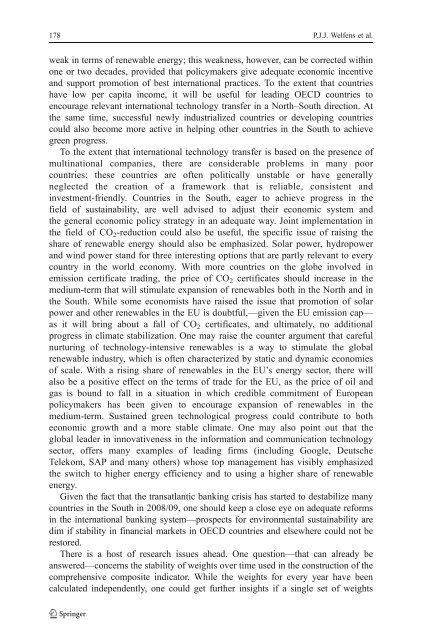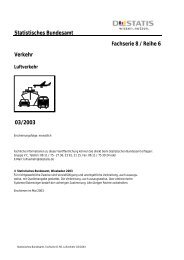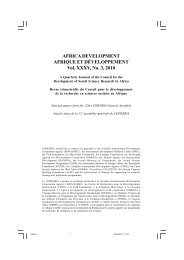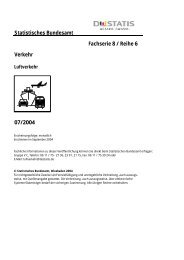The international economics of resources and resource ... - Index of
The international economics of resources and resource ... - Index of
The international economics of resources and resource ... - Index of
You also want an ePaper? Increase the reach of your titles
YUMPU automatically turns print PDFs into web optimized ePapers that Google loves.
178 P.J.J. Welfens et al.<br />
weak in terms <strong>of</strong> renewable energy; this weakness, however, can be corrected within<br />
one or two decades, provided that policymakers give adequate economic incentive<br />
<strong>and</strong> support promotion <strong>of</strong> best <strong>international</strong> practices. To the extent that countries<br />
have low per capita income, it will be useful for leading OECD countries to<br />
encourage relevant <strong>international</strong> technology transfer in a North–South direction. At<br />
the same time, successful newly industrialized countries or developing countries<br />
could also become more active in helping other countries in the South to achieve<br />
green progress.<br />
To the extent that <strong>international</strong> technology transfer is based on the presence <strong>of</strong><br />
multinational companies, there are considerable problems in many poor<br />
countries: these countries are <strong>of</strong>ten politically unstable or have generally<br />
neglected the creation <strong>of</strong> a framework that is reliable, consistent <strong>and</strong><br />
investment-friendly. Countries in the South, eager to achieve progress in the<br />
field <strong>of</strong> sustainability, are well advised to adjust their economic system <strong>and</strong><br />
the general economic policy strategy in an adequate way. Joint implementation in<br />
the field <strong>of</strong> CO 2-reduction could also be useful, the specific issue <strong>of</strong> raising the<br />
share <strong>of</strong> renewable energy should also be emphasized. Solar power, hydropower<br />
<strong>and</strong> wind power st<strong>and</strong> for three interesting options that are partly relevant to every<br />
country in the world economy. With more countries on the globe involved in<br />
emission certificate trading, the price <strong>of</strong> CO2 certificates should increase in the<br />
medium-term that will stimulate expansion <strong>of</strong> renewables both in the North <strong>and</strong> in<br />
the South. While some economists have raised the issue that promotion <strong>of</strong> solar<br />
power <strong>and</strong> other renewables in the EU is doubtful,—given the EU emission cap—<br />
as it will bring about a fall <strong>of</strong> CO 2 certificates, <strong>and</strong> ultimately, no additional<br />
progress in climate stabilization. One may raise the counter argument that careful<br />
nurturing <strong>of</strong> technology-intensive renewables is a way to stimulate the global<br />
renewable industry, which is <strong>of</strong>ten characterized by static <strong>and</strong> dynamic economies<br />
<strong>of</strong> scale. With a rising share <strong>of</strong> renewables in the EU’s energy sector, there will<br />
also be a positive effect on the terms <strong>of</strong> trade for the EU, as the price <strong>of</strong> oil <strong>and</strong><br />
gas is bound to fall in a situation in which credible commitment <strong>of</strong> European<br />
policymakers has been given to encourage expansion <strong>of</strong> renewables in the<br />
medium-term. Sustained green technological progress could contribute to both<br />
economic growth <strong>and</strong> a more stable climate. One may also point out that the<br />
global leader in innovativeness in the information <strong>and</strong> communication technology<br />
sector, <strong>of</strong>fers many examples <strong>of</strong> leading firms (including Google, Deutsche<br />
Telekom, SAP <strong>and</strong> many others) whose top management has visibly emphasized<br />
the switch to higher energy efficiency <strong>and</strong> to using a higher share <strong>of</strong> renewable<br />
energy.<br />
Given the fact that the transatlantic banking crisis has started to destabilize many<br />
countries in the South in 2008/09, one should keep a close eye on adequate reforms<br />
in the <strong>international</strong> banking system—prospects for environmental sustainability are<br />
dim if stability in financial markets in OECD countries <strong>and</strong> elsewhere could not be<br />
restored.<br />
<strong>The</strong>re is a host <strong>of</strong> research issues ahead. One question—that can already be<br />
answered—concerns the stability <strong>of</strong> weights over time used in the construction <strong>of</strong> the<br />
comprehensive composite indicator. While the weights for every year have been<br />
calculated independently, one could get further insights if a single set <strong>of</strong> weights








